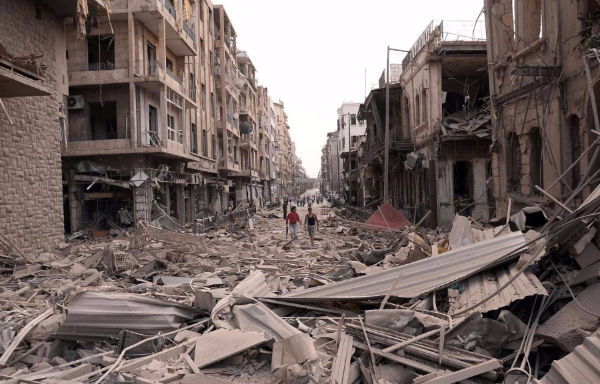Capacity Building in Failing States
- Daniel Koo (Ambassador)
- Feb 14, 2017
- 3 min read
Capacity building in failing states - this may sound somewhat complicated, but it’s quite simple when broken into two parts.
Some definitions
'Failing states' is a term that describes countries going through a turbulent period, and as a result, is in need of assistance from other countries or the United Nations.
'Capacity building' is when action is taken to improve a country’s circumstances, for example, their economic situation. Capacity building happens all over the world every day, especially for those with weak economies.
Now, bringing these definitions together, capacity building in failing states can be defined as countries undergoing economic, social or other pressures, which require support from other countries or the United Nations.

Image showing the level of physical destruction in Syria (Image Credits: Free Migration Agents)
Syria
While discussing this topic in a Model United Nations conference, the first country that came into my mind was Syria. Syria is undergoing both social and economic crises which have built up over the last few years, and is in need of immediate support. In order for capacity building to occur successfully, the question that comes to many people's minds is 'who should we support?'. The reason this question has to be answered before a plan is developed is because political stability is required in order for capacity building to take place.
In this case, Russia is aligned with the authoritative al-Assad regime, whilst the US is in support of the rebel groups. This means that direct support from any other UN country to either side can affect their relations with the other, leaving some undecided as they would like to maintain good relationships with both countries.
The most obvious solution is for Putin to stop supporting and providing aid to Assad. However, there are several obstacles. Firstly, it is highly unlikely that Putin would agree to any resolution that would put an end to his support for Assad. This is due to decades of close ties between Russia and Syria that date back to the Cold War, and the prospect of backing out now would make Putin appear weak, as though they are giving in to the Americans.
Secondly, Trump's new and more amicable approach to Russian dealings suggests that he will break away from more traditional American stances. This implies that he will make no effort in attempting to dissuade Putin from supporting Assad.
Thirdly, Trump's view on refugees also makes him less likely to sympathise with Syrian civilians, as he has expressed that he would 'look in [the Syrian children's] faces and say "you can't come... we don't know where their parents come from... They may be Isil, they may be Isil-related."' Most recently, Trump also signed an executive order that banned the entry of Syrian refugees into the US indefinitely. *
Further Complications
Capacity building in failing states is difficult to achieve due to the complex relations between different countries. Civil wars often turn into proxy wars, whilst the expansion of terrorist groups such as Daesh further complicate matters. The fact that permanent members of the UN Security Council have veto power also inhibits resolutions from being enacted, thus hindering this process.
*The author, writing this article from a neutral perspective, is not supportive nor critical of Trump and Putin's actions and views
Daniel is the founder and the head of KSCMUN (King’s School Canterbury Model United Nations) and regularly attends conferences all over the UK. He is passionate about discussing and creating resolutions for global crises, including capacity building in failing states, the refugee crisis in countries such as Syria and the spread of the Zika virus. Daniel also spends his time working as the head of marketing and public relations for Khonaa, a registered social enterprise in Hong Kong funding the education of minority groups all over Asia.















































Comments